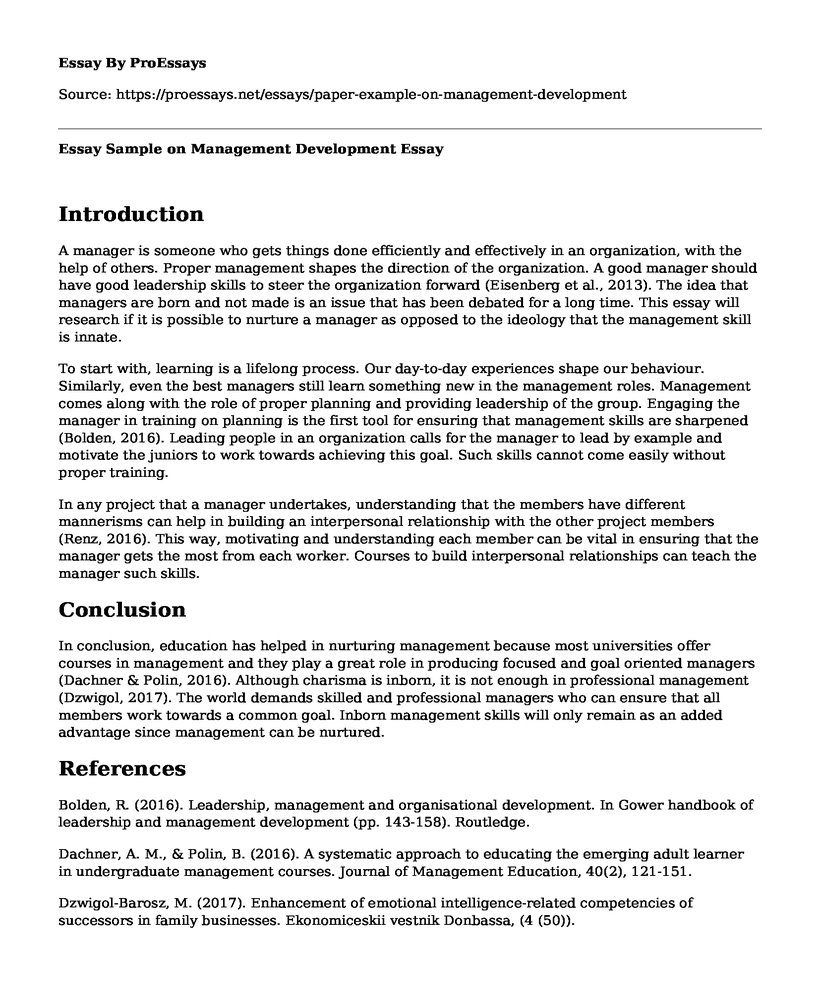Introduction
A manager is someone who gets things done efficiently and effectively in an organization, with the help of others. Proper management shapes the direction of the organization. A good manager should have good leadership skills to steer the organization forward (Eisenberg et al., 2013). The idea that managers are born and not made is an issue that has been debated for a long time. This essay will research if it is possible to nurture a manager as opposed to the ideology that the management skill is innate.
To start with, learning is a lifelong process. Our day-to-day experiences shape our behaviour. Similarly, even the best managers still learn something new in the management roles. Management comes along with the role of proper planning and providing leadership of the group. Engaging the manager in training on planning is the first tool for ensuring that management skills are sharpened (Bolden, 2016). Leading people in an organization calls for the manager to lead by example and motivate the juniors to work towards achieving this goal. Such skills cannot come easily without proper training.
In any project that a manager undertakes, understanding that the members have different mannerisms can help in building an interpersonal relationship with the other project members (Renz, 2016). This way, motivating and understanding each member can be vital in ensuring that the manager gets the most from each worker. Courses to build interpersonal relationships can teach the manager such skills.
Conclusion
In conclusion, education has helped in nurturing management because most universities offer courses in management and they play a great role in producing focused and goal oriented managers (Dachner & Polin, 2016). Although charisma is inborn, it is not enough in professional management (Dzwigol, 2017). The world demands skilled and professional managers who can ensure that all members work towards a common goal. Inborn management skills will only remain as an added advantage since management can be nurtured.
References
Bolden, R. (2016). Leadership, management and organisational development. In Gower handbook of leadership and management development (pp. 143-158). Routledge.
Dachner, A. M., & Polin, B. (2016). A systematic approach to educating the emerging adult learner in undergraduate management courses. Journal of Management Education, 40(2), 121-151.
Dzwigol-Barosz, M. (2017). Enhancement of emotional intelligence-related competencies of successors in family businesses. Ekonomiceskii vestnik Donbassa, (4 (50)).
Eisenberg, J., Lee, H. J., Bruck, F., Brenner, B., Claes, M. T., Mironski, J., & Bell, R. (2013). Can business schools make students culturally competent? Effects of cross-cultural management courses on cultural intelligence. Academy of Management Learning & Education, 12(4), 603-621.
Renz, D. O. (2016). The Jossey-Bass handbook of nonprofit leadership and management. John Wiley & Sons.
Cite this page
Essay Sample on Management Development. (2022, Oct 14). Retrieved from https://proessays.net/essays/paper-example-on-management-development
If you are the original author of this essay and no longer wish to have it published on the ProEssays website, please click below to request its removal:
- From Cross-Cultural Management to Global Leadership - Aricle Analysis Essay
- Essay Sample on Strategic Leadership and Big Data Phenomenon
- Security Protection Plan for Executives Essay Example
- Essay Example on Managing a Co's Environment: Need for an Array of Tools
- Essay Example on Leadership: How to Guide and Inspire Employees for Success.
- Paper Example on Reforming Complaints Processes: Involving HR for Positive Outcomes
- Securing Information with a Database: A Necessity for Organizational Structures - Essay Sample







